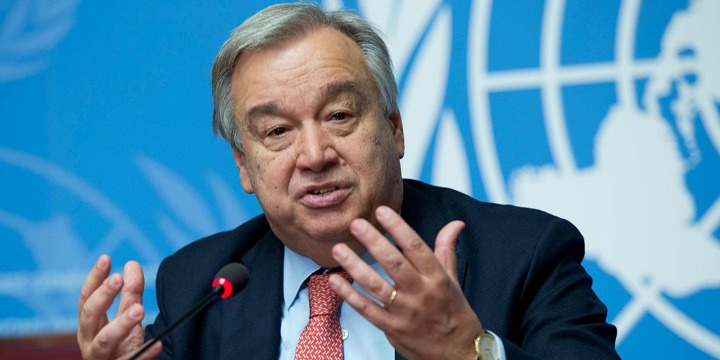UN Secretary-General Antonio Guterres, addressing the Conference on Disarmament (CD) in Geneva yesterday (Feb 26), announced a new United Nations initiative for nuclear disarmament, that would integrate the goal of a nuclear-weapon-free world into other key UN processes on conventional disarmament, peace-making and sustainable development.
‘Countries persist in the mistaken idea that nuclear weapons make the world safer,’ he said. ‘
‘There are currently around 15,000 nuclear weapons worldwide and the arms trade is flourishing more than at any time since the Cold war, with $1.5 trillion of spending annually. Taboos on nuclear tests and chemical weapons usage are under threat while talk of tactical nuclear weapons was leading in an extremely dangerous direction.’
‘In response to these concerns, I am preparing, in support of Member States, a new initiative aimed at giving greater impetus and direction to the global disarmament agenda. This initiative is aimed at restoring the role of disarmament as an integral component of our work to maintain international peace and security.’
‘At the global level, we must work together towards forging a new momentum on eliminating nuclear weapons,’ he urged the States Members of the CD.
‘My initiative will strive to offer a new perspective on traditional priorities; and a clear vision for the future; and also, practical and implementable actions,’ he said, noting that while the challenges are enormous, ‘history shows that it has been possible to reach agreement on disarmament and arms control even at the most difficult moments.’
Ban Ki-moon, the previous UN Secretary-General, also launched a key initiative on nuclear disarmament – a Five-Point Proposal which he unveiled at the UN in New York on October 24, 2009. The proposal gained a lot of support from civil society and parliaments. Indeed it served as the primary basis for resolutions and briefing materials of the Inter-Parliamentary Union, the global organisation of 178 parliaments. However, it failed to move the nuclear armed and allied countries to relinquish their reliance on nuclear deterrence or to end their nuclear weapons development programs.
‘The initiative of SG Guterres might have more impact on the policies and practices of the nuclear armed and allied countries, especially if it emphasizes alternative approaches to security in order to convince the nuclear reliant States that they no longer need to rely on these dangerous weapons,’ said Alyn Ware, Global Coordinator of Parliamentarians for Nuclear Non-proliferation and Disarmament.
‘However, the UNSG’s initiative will also have to address the vested interests that the nuclear weapons corporations have in maintaining the nuclear arms race,‘ he said. ‘They will not willingly give up the billions of dollars they receive making these weapons of mass annihilation. This is why the new global campaign Move the Nuclear Weapons Money is so important.’
The initiative from UNSG Guterres comes at a time of increased risks of nuclear conflict, which led the Bulletin of Atomic Scientists last month to move the hands of the Doomsday Clock to 2 Minutes to Midnight.
However, it also comes at a time of new opportunities for nuclear disarmament.
- The Conference on Disarmament, the UN’s principal disarmament negotiation forum, last week resumed disarmament deliberations and negotiations after 20 years of inaction;
- The United Nations General Assembly will hold a High-Level Conference on Nuclear Disarmament in May this year;
- Move the Nuclear Weapons Money, the global campaign to cut nuclear weapons spending, will have a major civil society action Count the Nuclear Weapons Money in NY during the High-Level Conference;
- And a Treaty on the Prohibition of Nuclear Weapons was opened for signature in September last year.
The initiative includes initial consultations with key stakeholders, before launching the outcome plan in April or May.
‘I have asked my High Representative for Disarmament Affairs to reach out to a broad spectrum of actors to develop this initiative further, including all partners within the United Nations system, leading experts, Member States and civil society,’ said Guterres.Air Force 1 Sage Low

